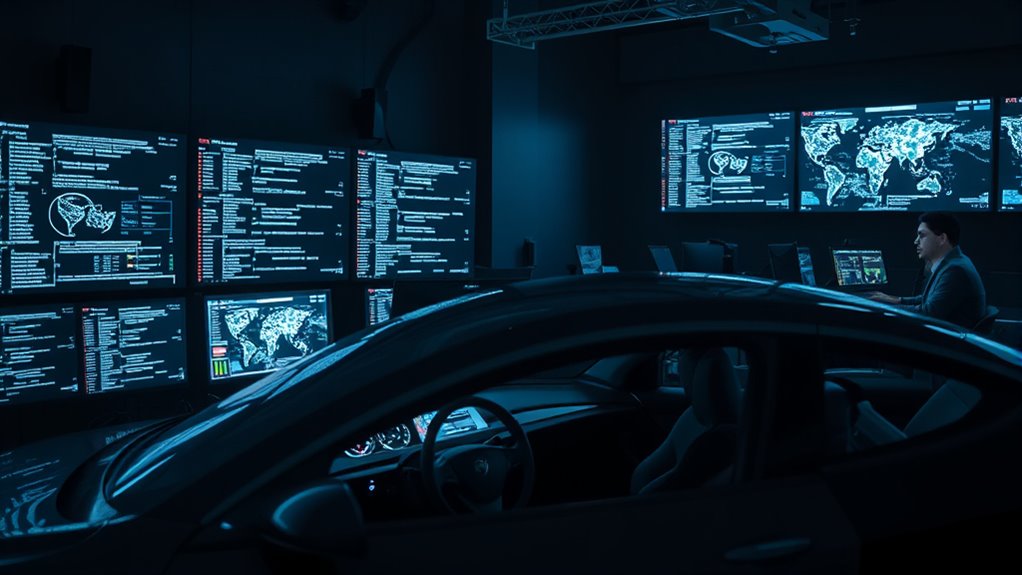The U.S. NSA has uncovered that Chinese hackers are embedding malware in electric car software, creating serious cybersecurity risks. This threat is linked to ongoing cyber espionage and sophisticated attacks on critical infrastructure. Manufacturers are grappling with vulnerabilities in connected systems, risking remote control or data breaches. As the industry works to strengthen defenses, you'll find there's much more to explore about the implications for electric vehicle safety and privacy.
Key Takeaways
- Chinese hackers have been identified embedding malware in electric car software, posing significant cybersecurity threats.
- Recent attacks include the Volkswagen breach, where over 19,000 documents were stolen, indicating sophisticated cyber espionage.
- Electric vehicles' reliance on connected systems increases vulnerabilities, compromising both software and data security.
- Manufacturers are actively researching and testing to patch vulnerabilities, but hacker tactics continuously evolve.
- The NSA plays a vital role in detecting threats, highlighting the need for heightened public awareness of automotive cybersecurity issues.

The U.S. National Security Agency (NSA) is on the front lines, uncovering alarming activities from Chinese hackers embedding malware in electric car software. As you might know, these hackers are notorious for their sophisticated cyberattacks and often target critical infrastructure and intellectual property. With the automotive industry increasingly shifting toward electric vehicles (EVs), the stakes have never been higher. The reliance on connected systems makes these vehicles particularly vulnerable to cyber threats.
The NSA reveals alarming Chinese hacker activities embedding malware in electric car software, heightening cybersecurity risks in the EV sector.
Recent incidents like the Volkswagen breach, where over 19,000 documents were stolen, have raised significant red flags. Investigations suggest Chinese involvement, showcasing a pattern of cyber espionage. Moreover, Volkswagen's subsidiary, Cariad, exposed sensitive data of over 800,000 EV owners due to poor IT configurations. It's clear that vulnerabilities exist not just in software but in how manufacturers handle data security. The attack lasted five years, and it underscores the persistent threat posed by malicious actors.
You should consider how this could affect you, especially as car manufacturers collect extensive customer data, raising serious privacy and security concerns. The NSA's efforts to detect these threats are crucial, especially as the global community becomes increasingly aware of cybersecurity issues.
Chinese hacking groups often execute state-sponsored attacks targeting strategic sectors, including automotive and aerospace. They aim to steal intellectual property, which poses a significant risk not only to companies but also to national security. You may be wondering how this impacts everyday drivers: well, the risk of remote control or sabotage of EVs is a genuine concern.
Recent findings show that electric cars, although innovative, have their share of security flaws. For instance, Skoda vehicles were found to have vulnerabilities that could allow hackers to track cars remotely. Audi and SEAT have faced similar issues, emphasizing that this is an industry-wide challenge.
Manufacturers are responding by researching and testing their systems to identify and patch vulnerabilities, but their efforts must keep pace with the evolving tactics of hackers. As you think about the future of driving electric, it's essential to remain aware of these cybersecurity risks.
The NSA's ongoing work to mitigate these threats highlights the urgent need for better security measures in the automotive sector. Public awareness is growing, and it's crucial that you stay informed about how these developments could affect your safety and privacy on the road.
Frequently Asked Questions
What Specific Electric Car Models Were Targeted by the Hackers?
You might be surprised to learn that several electric car models have faced targeted attacks.
Specifically, the Tesla Model S was hacked in 2016, compromising its brakes and doors.
In 2022, a German specialist exploited vulnerabilities in various Tesla models through a third-party app.
Other brands like Volkswagen ID.3 and Skoda also experienced data exposure issues linked to security flaws, highlighting the risks associated with electric vehicles and their connected systems.
How Can Consumers Protect Their Electric Vehicles From Such Threats?
Think of your electric vehicle as a fortress. To protect it from potential threats, secure your connectivity by using strong passwords and avoiding public Wi-Fi.
Keep your vehicle's software updated regularly, like fortifying your walls against invaders. Use encryption to safeguard your data and implement robust authentication protocols.
Finally, stay informed about cybersecurity risks and educate yourself on best practices, ensuring your fortress remains impenetrable and your vehicle safe from harm.
What Is the Potential Impact of This Malware on Vehicle Safety?
Malware embedded in electric car software can significantly compromise your vehicle's safety.
If hackers gain control, they could manipulate critical functions like acceleration and braking, putting you and others at risk.
Additionally, the data collected by your vehicle could be exposed, leading to privacy violations.
The lack of robust security measures in many vehicles makes them vulnerable, so staying informed about potential threats is essential for ensuring your safety on the road.
Are Other Countries Also Experiencing Similar Cyber Threats?
Imagine a neighborhood watch where one house gets broken into, raising alarms for everyone.
Similarly, other countries are facing similar cyber threats as the automotive sector becomes more interconnected. In 2024 alone, over 100 ransomware attacks targeted vehicles globally, highlighting this growing issue.
As cyber risks proliferate, nations are ramping up their defenses. You must stay informed and proactive to ensure your safety and that of your assets in this evolving landscape.
What Measures Is the U.S. Government Taking in Response?
The U.S. government's responding to cybersecurity threats by investigating smart cars for potential risks.
Agencies like the FBI and Commerce Department are assessing vulnerabilities in connected vehicle software. They're also considering voluntary cybersecurity labeling to help you identify secure devices.
Additionally, the government's collaborating with the automotive industry to implement stronger security measures, conducting regular software updates, and developing AI-powered tools to detect and prevent cyber threats effectively.
Conclusion
As you navigate the winding roads of cybersecurity, remember that shadows lurk beneath the surface, waiting for a chance to strike. The NSA's discovery of Chinese hackers embedding malware in electric car software serves as a cautionary tale—a reminder that even the most advanced vehicles can carry hidden dangers. Just like a wolf in sheep's clothing, these threats can disguise themselves as harmless innovations. Stay vigilant, for in the realm of technology, not everything is as it seems.









